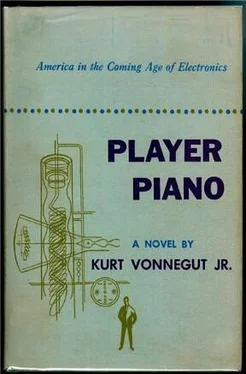"No sir," said the chief engineer of the project. "As you say, not without the thingamajigs and whatchamacallits."
"What'd he say?" said Lynn, catching Khashdrahr's sleeve.
"An ancient riddle," said Khashdrahr, and it was plain that he didn't want to go on, that something sacred was involved. But he was also a polite man, and the inquiring eyes of the crowd demanded more of an explanation. "Our people believe," he said shyly, "that a great, all-wise god will come among us one day, and we shall know him, for he shall be able to answer the riddle, which EPICAC could not answer. When he comes," said Khashdrahr simply, "there will be no more suffering on earth."
"All-wise god, eh?" said Lynn. He licked his lips and patted down his unruly forelock. "How's the riddle go?"
Khashdrahr recited:
"Silver bells shall light my way,
And nine times nine maidens fill my day,
And mountain lakes will sink from sight,
And tigers' teeth will fill the night."
President Lynn squinted at the cavern roof thoughtfully. "Mmm. Silver bells, eh?" He shook
his head. "That's a stinker, you know? A real stinker. I give up." "I'm not surprised," said Khashdrahr. "I'm not surprised. I expect you do." Halyard helped the Shah, who seemed to have been aged and exhausted by the emotional ordeal, into the electric car.
As they rode to the foot of the elevator, the Shah came back to life somewhat and curled his lip at the array of electronics about them. " Baku! " he said.
"That's a new one on me," said Halyard to Khashdrahr, feeling warmly toward the little interpreter, who had squared away Jonathan Lynn so beautifully. "What's Baku? "
"Little mud and straw figures made by the Surrasi, a small infidel tribe in the Shah's land."
"This looks like mud and straw to him?"
"He was using it in the broader sense, I think, of false god."
"Urn," said Halyard. "Well, how are the Surrasi doing?"
"They all died of cholera last spring." He added after a moment, "Of course." He shrugged, as though to ask what else people like that could possibly expect. " Baku. "
THE Kroner Home, just outside Albany, was a Victorian mansion, perfectly restored and maintained down to the filigree along the eaves, and the iron spikes along the roof peak. The archprophet of efficiency, Kroner, preferred it to the gracile, wipe-clean-with-a-damp-cloth steel and glass machines almost all of the engineers and managers lived in. Though Kroner had never accounted for his having bought the place - beyond saying that he liked lots of room - it was so in keeping with him that no one gave the anachronism more than passing thought.
A portrait painter had sensed the rightness of the setting, with no clues other than Kroner's face. The painter had been commissioned to do portraits of all the district managers. He did them from photographs, since the managers were too busy - or prudently claimed to be - to sit. Intuitively, the painter had depicted Kroner in a red plush chair, with a massive wedding ring prominently displayed, and with a background of heavy velvet drapes.
The mansion was one more affirmation of Kroner's belief that nothing of value changed; that what was once true is always true; that truths were few and simple; and that a man needed no knowledge beyond these truths to deal wisely and justly with any problem whatsoever.
"Come in," rumbled Kroner gently, answering the door himself. He seemed to fill the whole house with his slow strength and rock-bound calm. He was as informal as he ever became, having replaced his double-breasted suit coat with a single-breasted one of a slightly lighter shade and with suede patches at the elbows. The coat, he explained to visitors, was something his wife had given him years ago, something which he'd only recently mustered nerve enough to wear.
"I love your house more every time I see it," said Anita.
"You must tell Janice that." Janice was Mrs. Kroner, who smiled sweetly from the living room. She was a fat repository of truisms, adages, and homilies, and was usually addressed by the young engineers and managers as "Mom."
Mom, Paul recalled, had never liked that Finnerty boy, who would never call her Mom nor confide in her. Once, after she'd prodded him to unburden himself and feel better, he'd rather testily told her that he'd already fled one mother. Paul she liked, because Paul, as a youngster, had confided in her now and then. He would never do it again, but his demeanor before her conveyed that his failure to confide recently wasn't due to revulsion, but to a lack of problems.
"Hello, Mom," said Paul.
"Hello, Mom," said Anita.
"You children take a load off your feet," said Mom. "Now just tell me all about yourselves."
"Well, we've redone the kitchen," said Anita.
Mom was thrilled, eager for details.
Kroner hung his huge head, as though listening intently to the small talk, or, more likely, Paul thought, counting away the seconds before it would be polite to separate the men and women - a custom of the house.
As Anita paused for breath, Kroner stood, beamed, and suggested that Paul come into his study to see the guns. It was the same gambit every time - the men were to see the guns. Years ago, Anita had made the mistake of saying she was interested in guns, too. Kroner had politely told her that his weren't the kind women liked.
Mom's response was always the same, too: "Oh guns - I hate them. I can't see why men want to go around shooting sweet little animals."
The fact was, Kroner never fired his guns. His pleasure seemed to be in owning and handling them. He also used them for props, to give an air of informality to his man-to-man talks. He announced raises and promotions, demotions and firings, and praised or warned, always in seemingly casual asides made while swabbing a bore.
Paul followed him into the dark-paneled study, and waited for him to choose his weapon from the gunrack that filled one wall. Kroner ran his index finger along the collection, like a stick along a picket fence. It had been a matter of speculation among Kroner's underlings as to whether there was any significance in the guns he chose for a particular discussion. For a while the rumor was current that shotguns were bad news, rifles were good news. But it hadn't withstood the test of time. Kroner finally chose a ten-gauge shotgun, broke open the breach, and squinted through the bore at a streetight outside.
"Wouldn't dare shoot modern ammunition in this one," said Kroner. "Twist barrel - thing'd go all to pieces. But look at that inlay work, Paul."
"Beautiful. Priceless."
"Some man spent maybe two years on it. Time didn't mean anything in those days. The industrial dark ages, Paul."
"Yessir."
He selected a cleaning rod and lined up on his desk top a can of oil, ajar of grease, and several cloth patches. "Got to keep after a bore, or it'll pit on you just like that." He snapped his fingers. He oiled a patch, twisted it about the tip of the cleaning rod. "Especially in this climate."
"Yessir." Paul started to light a cigarette, and then remembered Anita's warning in the outline.
Kroner drove the cleaning rod downward. "Where's Ed Finnerty, by the way?"
"Don't know, sir."
"Police are looking for him."
"Really?"
Kroner slid the patch back and forth and didn't look at Paul. "Uh-huh. Now that he's out of a job, he's got to register with the police, and he hasn't."
"I left him downtown in Homestead last night."
"I know that. I thought maybe you knew where he went."
Kroner had a habit of saying he already knew what he'd just been told. Paul was sure the old man didn't really know anything about the night before. "I haven't any idea." He didn't want to make trouble for anyone. Let the police find out that Finnerty was with Lasher, if they could.
Читать дальше








![Курт Воннегут - Вампитеры, фома и гранфаллоны [litres]](/books/397997/kurt-vonnegut-vampitery-foma-i-granfallony-litre-thumb.webp)